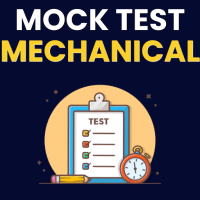Mechanical Engineering Exam > Mechanical Engineering Questions > What is the syllabus for the GATE ME exam?
Start Learning for Free
What is the syllabus for the GATE ME exam?
Most Upvoted Answer
What is the syllabus for the GATE ME exam?
Syllabus for GATE ME Exam
The Graduate Aptitude Test in Engineering (GATE) for Mechanical Engineering (ME) is a comprehensive examination that tests the knowledge and understanding of various subjects in the field. The GATE ME syllabus is designed to cover all the essential topics and concepts related to mechanical engineering. Let's discuss the key subjects and topics included in the GATE ME syllabus.
Engineering Mathematics
1. Linear Algebra: Matrix algebra, systems of linear equations, eigenvalues, and eigenvectors.
2. Calculus: Functions of single variable, limits, continuity, and differentiability, mean value theorems, evaluation of definite and improper integrals, partial derivatives, total derivative, maxima and minima, gradient, divergence, and curl, vector identities, line, surface, and volume integrals, Stokes, Gauss, and Green's theorems.
3. Differential Equations: First-order equations (linear and nonlinear), higher-order linear differential equations with constant coefficients, Cauchy's and Euler's equations, initial and boundary value problems, Laplace transforms, solutions of heat, wave and Laplace's equations.
4. Numerical Methods: Numerical solutions of linear and non-linear algebraic equations, integration by trapezoidal and Simpson's rules, single and multi-step methods for differential equations.
Applied Mechanics and Design
1. Engineering Mechanics: Free-body diagrams and equilibrium, trusses and frames, virtual work and energy methods, centroid, moment of inertia, and friction.
2. Mechanics of Materials: Stress and strain, elastic constants, axial, shear and bending moment diagrams, torsion of circular and thin-walled sections, combined stresses, deflection of beams, and failure theories.
Fluid Mechanics and Thermal Sciences
1. Fluid Mechanics: Fluid properties, fluid statics, Bernoulli's equation, flow through pipes, viscous flow, boundary layer, drag, and lift.
2. Heat-Transfer: Conduction, convection, and radiation, heat exchangers, steady and unsteady heat conduction, thermal boundary layer, and condensation and boiling.
Materials, Manufacturing, and Industrial Engineering
1. Engineering Materials: Structure and properties of engineering materials, phase diagrams, heat treatment, and its applications.
2. Manufacturing Processes: Casting, forming, machining, welding, and metrology.
3. Industrial Engineering: Production planning and control, inventory control, operations research, and quality management.
Thermodynamics
1. Thermodynamic Systems and Processes: Laws of thermodynamics, properties of pure substances, thermodynamic equilibrium, and ideal and real gases.
2. Applications: Power engineering, refrigeration, and air-conditioning.
Machine Design
1. Design of Machine Elements: Design of joints, bearings, gears, and shafts.
2. Theory of Machines: Kinematics and dynamics of machines, vibrations, and balancing.
Engineering Mathematics
The engineering mathematics section covers various mathematical concepts and techniques that are essential for solving engineering problems. It includes topics like linear algebra, calculus, differential equations, and numerical methods.
Applied Mechanics and Design
This section focuses on the principles of engineering mechanics and their applications in design. It covers topics like statics, dynamics, mechanics of materials, and failure theories.
Fluid Mechanics and Thermal Sciences
The Graduate Aptitude Test in Engineering (GATE) for Mechanical Engineering (ME) is a comprehensive examination that tests the knowledge and understanding of various subjects in the field. The GATE ME syllabus is designed to cover all the essential topics and concepts related to mechanical engineering. Let's discuss the key subjects and topics included in the GATE ME syllabus.
Engineering Mathematics
1. Linear Algebra: Matrix algebra, systems of linear equations, eigenvalues, and eigenvectors.
2. Calculus: Functions of single variable, limits, continuity, and differentiability, mean value theorems, evaluation of definite and improper integrals, partial derivatives, total derivative, maxima and minima, gradient, divergence, and curl, vector identities, line, surface, and volume integrals, Stokes, Gauss, and Green's theorems.
3. Differential Equations: First-order equations (linear and nonlinear), higher-order linear differential equations with constant coefficients, Cauchy's and Euler's equations, initial and boundary value problems, Laplace transforms, solutions of heat, wave and Laplace's equations.
4. Numerical Methods: Numerical solutions of linear and non-linear algebraic equations, integration by trapezoidal and Simpson's rules, single and multi-step methods for differential equations.
Applied Mechanics and Design
1. Engineering Mechanics: Free-body diagrams and equilibrium, trusses and frames, virtual work and energy methods, centroid, moment of inertia, and friction.
2. Mechanics of Materials: Stress and strain, elastic constants, axial, shear and bending moment diagrams, torsion of circular and thin-walled sections, combined stresses, deflection of beams, and failure theories.
Fluid Mechanics and Thermal Sciences
1. Fluid Mechanics: Fluid properties, fluid statics, Bernoulli's equation, flow through pipes, viscous flow, boundary layer, drag, and lift.
2. Heat-Transfer: Conduction, convection, and radiation, heat exchangers, steady and unsteady heat conduction, thermal boundary layer, and condensation and boiling.
Materials, Manufacturing, and Industrial Engineering
1. Engineering Materials: Structure and properties of engineering materials, phase diagrams, heat treatment, and its applications.
2. Manufacturing Processes: Casting, forming, machining, welding, and metrology.
3. Industrial Engineering: Production planning and control, inventory control, operations research, and quality management.
Thermodynamics
1. Thermodynamic Systems and Processes: Laws of thermodynamics, properties of pure substances, thermodynamic equilibrium, and ideal and real gases.
2. Applications: Power engineering, refrigeration, and air-conditioning.
Machine Design
1. Design of Machine Elements: Design of joints, bearings, gears, and shafts.
2. Theory of Machines: Kinematics and dynamics of machines, vibrations, and balancing.
Engineering Mathematics
The engineering mathematics section covers various mathematical concepts and techniques that are essential for solving engineering problems. It includes topics like linear algebra, calculus, differential equations, and numerical methods.
Applied Mechanics and Design
This section focuses on the principles of engineering mechanics and their applications in design. It covers topics like statics, dynamics, mechanics of materials, and failure theories.
Fluid Mechanics and Thermal Sciences
Attention Mechanical Engineering Students!
To make sure you are not studying endlessly, EduRev has designed Mechanical Engineering study material, with Structured Courses, Videos, & Test Series. Plus get personalized analysis, doubt solving and improvement plans to achieve a great score in Mechanical Engineering.

|
Explore Courses for Mechanical Engineering exam
|

|
Similar Mechanical Engineering Doubts
What is the syllabus for the GATE ME exam?
Question Description
What is the syllabus for the GATE ME exam? for Mechanical Engineering 2024 is part of Mechanical Engineering preparation. The Question and answers have been prepared according to the Mechanical Engineering exam syllabus. Information about What is the syllabus for the GATE ME exam? covers all topics & solutions for Mechanical Engineering 2024 Exam. Find important definitions, questions, meanings, examples, exercises and tests below for What is the syllabus for the GATE ME exam?.
What is the syllabus for the GATE ME exam? for Mechanical Engineering 2024 is part of Mechanical Engineering preparation. The Question and answers have been prepared according to the Mechanical Engineering exam syllabus. Information about What is the syllabus for the GATE ME exam? covers all topics & solutions for Mechanical Engineering 2024 Exam. Find important definitions, questions, meanings, examples, exercises and tests below for What is the syllabus for the GATE ME exam?.
Solutions for What is the syllabus for the GATE ME exam? in English & in Hindi are available as part of our courses for Mechanical Engineering.
Download more important topics, notes, lectures and mock test series for Mechanical Engineering Exam by signing up for free.
Here you can find the meaning of What is the syllabus for the GATE ME exam? defined & explained in the simplest way possible. Besides giving the explanation of
What is the syllabus for the GATE ME exam?, a detailed solution for What is the syllabus for the GATE ME exam? has been provided alongside types of What is the syllabus for the GATE ME exam? theory, EduRev gives you an
ample number of questions to practice What is the syllabus for the GATE ME exam? tests, examples and also practice Mechanical Engineering tests.

|
Explore Courses for Mechanical Engineering exam
|

|
Suggested Free Tests
Signup for Free!
Signup to see your scores go up within 7 days! Learn & Practice with 1000+ FREE Notes, Videos & Tests.

























